The International Public Relations Network (IPRN) celebrated its 30th anniversary with a convention held in Porto, Portugal. Around 50 members from 30 agencies, across four continents gathered to present case studies, share best practice, and discuss the future of the sector in light of changes in international politics and the rapid growth of Artificial Intelligence.
Significantly, IPRN has now relocated its headquarters from Madrid to Brussels, in a move aimed at bringing the network closer to European institutions. The move positions the network closer to the heart of European decision-making and supports its ambition to be more actively involved in European Union affairs. As part of this transition, IPRN has also been listed in the EU Transparency Register.
Rodrigo Viana de Freitas, IPRN Executive President commented: “This step is fundamental to preparing the organisation for the years ahead.” He adds: “The goal is to equip IPRN with management capacity to continue expanding into new geographies and to support members in generating international business with brands and institutions across all sectors.”
Sarah Woodhouse, director and co-owner of strategic communications agency, AMBITIOUS, commented, “As PR Professionals, we need to stay on top of dynamic global and domestic events and sentiment to provide consultancy and work with the C-suite. The IPRN Convention in Porto highlighted the importance of agile planning – using phased strategies that evolve as external conditions change.”
Rhodri Harries, managing director tech and health at Cavendish says, “It was fantastic to connect with peers across markets and sectors. The conversations around AI and data-driven trust were especially valuable, and we’re excited to bring fresh thinking into our work at Cavendish.”
Harvey Choat, managing director at Nexus, explains, “Having strong international partners is one of the most powerful assets in our industry. IPRN continues to connect us to trusted local expertise across the world.”
Mayor of Porto welcomes the group
The annual meeting programme included a morning at Porto Business School, an event partner, with two international keynote sessions: “Donald Trump’s Foreign Policy: Impacts on International Relations,” by Jorge Rodrigues, coordinator of PBS’s Geopolitics Observatory, and “Artificial Intelligence and the New World,” by Ricardo Ribeiro, Director of Digital Transformation at Banco Montepio and professor in postgraduate and MBA programs at various universities.
The group was also welcomed by the Mayor of Porto, another event partner, with a formal reception at Casa do Roseiral. On the occasion, Rui Moreira emphasised Porto’s cultural and international dimension, explaining the city’s transformation process over the past 12 years. The event concluded with the annual awards ceremony, which this year honored a breast cancer awareness campaign from Puerto Rico as the best of the year.
About IPRN
The International Public Relations Network is a global network of independent public relations and communications agencies, with around 50 members in over 100 major cities and more than 30 countries across five continents. It represents all sectors of the industry and has a combined turnover of approximately USD 150 million, with over 1,000 staff and 4,000 clients across its member agencies.
The International Public Relations Network (IPRN) celebrated its 30th anniversary with a convention held in Porto, Portugal. Around 50 members from 30 agencies, across four continents gathered to present case studies, share best practice, and discuss the future of the sector in light of changes in international politics and the rapid growth of Artificial Intelligence.
Significantly, IPRN has now relocated its headquarters from Madrid to Brussels, in a move aimed at bringing the network closer to European institutions. The move positions the network closer to the heart of European decision-making and supports its ambition to be more actively involved in European Union affairs. As part of this transition, IPRN has also been listed in the EU Transparency Register.
Rodrigo Viana de Freitas, IPRN Executive President commented: “This step is fundamental to preparing the organisation for the years ahead.” He adds: “The goal is to equip IPRN with management capacity to continue expanding into new geographies and to support members in generating international business with brands and institutions across all sectors.”
Sarah Woodhouse, director and co-owner of strategic communications agency, AMBITIOUS, commented, “As PR Professionals, we need to stay on top of dynamic global and domestic events and sentiment to provide consultancy and work with the C-suite. The IPRN Convention in Porto highlighted the importance of agile planning – using phased strategies that evolve as external conditions change.”
Rhodri Harries, managing director tech and health at Cavendish says, “It was fantastic to connect with peers across markets and sectors. The conversations around AI and data-driven trust were especially valuable, and we’re excited to bring fresh thinking into our work at Cavendish.”
Harvey Choat, managing director at Nexus, explains, “Having strong international partners is one of the most powerful assets in our industry. IPRN continues to connect us to trusted local expertise across the world.”
Mayor of Porto welcomes the group
The annual meeting programme included a morning at Porto Business School, an event partner, with two international keynote sessions: “Donald Trump’s Foreign Policy: Impacts on International Relations,” by Jorge Rodrigues, coordinator of PBS’s Geopolitics Observatory, and “Artificial Intelligence and the New World,” by Ricardo Ribeiro, Director of Digital Transformation at Banco Montepio and professor in postgraduate and MBA programs at various universities.
The group was also welcomed by the Mayor of Porto, another event partner, with a formal reception at Casa do Roseiral. On the occasion, Rui Moreira emphasised Porto’s cultural and international dimension, explaining the city’s transformation process over the past 12 years. The event concluded with the annual awards ceremony, which this year honored a breast cancer awareness campaign from Puerto Rico as the best of the year.
About IPRN
The International Public Relations Network is a global network of independent public relations and communications agencies, with around 50 members in over 100 major cities and more than 30 countries across five continents. It represents all sectors of the industry and has a combined turnover of approximately USD 150 million, with over 1,000 staff and 4,000 clients across its member agencies.
We have a few desks available in our vibrant shared creative space in Easton. You’ll be working alongside a friendly community of filmmakers, animators, and designers – ideal for anyone in the creative industries.
The space includes:
Conveniently located near the Bristol–Bath Cycle Path, Lawrence Hill train station, and local favourites like The Plough and The Queens Head pubs.
Desks from £230/month, depending on storage requirements.
Bristol’s dBs Institute has announced the programme for Driven By Sound: Sonic Identities, a free one day conference for the city’s music industry and those looking to further careers in the sector.
The conference, which will take place on Saturday 15 February at the Mitchell Lane campus in Redcliffe, will explore the role identity plays in music creation and technology.
From 1pm to 7pm, the afternoon conference will bring together industry experts, producers and academics from the city’s music scene. Featuring a packed schedule of seminars, panel discussions, and workshops the event will examine the creative and technological forces shaping modern music, from AI to experimental songwriting.
With only 100 free tickets available through Eventbrite, the event offers an opportunity to connect with key figures from Bristol’s renowned music scene.
Hannah Phipps, dBs Institute’s Managing Director, commented: “We’re really excited to open our doors to the wider musical and creative community for a day of conversation and experimentation; two of our favourite things to do here at dBs.”
“If you’re not a noise-maker (yet!) or if you’re just feeling curious, our spaces are welcoming for anyone at any level. So, even if you don’t fancy getting hands-on, there’ll be opportunities to sit back and listen, or have a nose around some of our amazing studios.”
The event will open with dBs pro creative director Jay Auborn, who will explore the emotional potential of AI in composition during The Charismatic Composer, alongside composers and engineers from Charisma.ai —the team behind the AI-driven game The Kraken Wakes, which The Financial Times described as “potentially revolutionary.”
Bristol’s vibrant music venue scene will also take centre stage in Building A City From The Grassroots Up, a panel hosted by dBs Institute managing director Hannah Phipps, featuring representatives from Motion, Clock Factory and The Underground.
Closing the day, in the conference’s headline slot, is pioneering Bristol producer Pinch —whose Tectonic label has helped define UK electronic music—will join writer, DJ, and Butterz label manager Elijah for an exclusive In Conversation With session.
Beyond the lectures, panel discussions and seminars, there will be a range of practical workshops covering modular synthesis, graphic scores and vocal experimentation, the relationship between DJing and wellbeing, how to process 3D audio and recordings using Dolby Atmos and blending acoustic and synthesised layers using Ableton Rack.
For more information and to grab one of the final few tickets remaining, visit the event’s Eventbrite page. For more information about dBs Institute and courses available at the Bristol campus visit https://www.dbsinstitute.ac.uk or stay up to date via social media by following @dbs_institute on X, Instagram and TikTok, @dbsinstituteuk on Facebook and @dbs-institute on LinkedIn.
BeReal, the social media platform known for its unfiltered, real-time glimpses into users’ lives, is expanding its advertising model to the United Kingdom and EMEA (Europe, Middle East, and Africa) following a successful launch in the United States. This expansion marks a significant shift in how brands can connect with users on social media. Forget perfectly polished social media feeds and influencer-driven campaigns; BeReal is challenging brands to embrace authenticity and connect with users in a way that feels, well, real.
In a digital landscape saturated with curated content, BeReal has carved a unique space by championing every day, unfiltered sharing. The app’s core feature—a daily notification prompting users to share a photo using both front and back cameras simultaneously—provides a truly authentic and unedited glimpse into users’ lives.
But BeReal’s commitment to authenticity isn’t just about user experience; it’s the bedrock of its advertising model. As CEO Aymeric Roffé claims, “We have always put authenticity first on BeReal, and our advertising model reflects the same principle. We offer companies the opportunity to connect with our audience in a way that feels authentic and engaging, while staying true to the ethos that has made BeReal a phenomenon”.
Boasting 100 million downloads and 20 million daily active users, BeReal has clearly captured the attention of Gen Z. The platform’s user base is predominantly young, with 71% aged 18 to 27, and it shows a notable 62% skew toward female users. However, its true strength lies in its exceptional user engagement.
A remarkable 70% of daily active users post content every day, spending an average of 30 minutes in the app. This level of consistent activity creates a highly receptive environment for brands seeking authentic connections with a truly engaged audience.
Leading brands like Nike, Netflix, and Pepsi have already partnered with BeReal, recognising the platform’s potential for authentic audience engagement. By embracing BeReal’s unique format, these companies are tapping into a space where content feels personal and direct.
BeReal’s advertising model presents brands with a unique opportunity to connect with a highly engaged audience in an authentic and impactful way. Here’s a look at the key features and opportunities in 2025:
BeReal offers robust targeting options, allowing brands to reach their ideal audience with precision:
The minimum investment for advertising in BeReal is £10,000. While this represents a significant investment, the potential for authentic engagement and high visibility within a highly engaged user base makes it a compelling option for brands seeking to stand out in a crowded digital landscape.
BeReal offers an intriguing opportunity for brands to connect with an engaged and discerning audience. By prioritising authentic storytelling, it provides a refreshing alternative to traditional advertising.
With BeReal, brands can:
That said, while BeReal is an exciting platform to watch, its high advertising costs and relatively niche audience mean we’re not yet recommending it to all our partners.
As the platform evolves and scales, it could become a valuable addition to marketing strategies. Still, for now, we believe it’s best suited for brands with a strong focus on innovation and storytelling—and the budget to match.
If you’re curious about BeReal’s potential or want to explore how it could complement your digital marketing strategy, contact the team at Mostly Media. Let’s discuss whether this emerging platform aligns with your goals and budget.
BY: JOE SMITH, Weston College Group Apprenticeship Strategic Accounts Manager
In today’s business landscape, digital skills are not just an advantage—they’re essential. Yet, many businesses, particularly smaller ones, struggle to find or afford the right talent to optimise their digital presence. Degree apprenticeships are emerging as a powerful solution to bridge this gap, enabling companies to access fresh talent and develop in-house expertise without the high costs of hiring fully qualified professionals. Weston College’s Higher Education arm, University Centre Weston (UCW) now offers two innovative pathways: the Digital User Experience (UX) Degree Apprenticeship and the Digital and Technology Solutions Degree Apprenticeship, BSc (Hons), both of which provide accessible routes to high-level digital skills essential for your business.
What are these qualifications?
Digital User Experience (UX) Degree Apprenticeship Combines digital development with sociological, psychological and traditional design approaches to achieve your creative goals. This approach enables a member of your team to design, prototype, and build interactive user interfaces, data visualisations, responsive installations, and other user-focused experiences.
Digital and Technology Solutions Degree Apprenticeship, BSc (Hons) is a multidisciplinary programme designed to equip apprentices with a broad set of technical and analytical skills to support the digital transformation needs of businesses across industries. This degree covers core areas like data analytics, software engineering, cyber security, and Network Engineering, giving apprentices a robust foundation in technology solutions.
Dispelling a Common Myth: Degree Apprenticeships Are Not Just for Big Businesses
Many small to medium-sized enterprises (SMEs) mistakenly assume that degree apprenticeships are primarily for large corporations. However, SMEs can absolutely benefit from these programmes, gaining access to emerging talent that will enhance their digital strategies and support long-term growth. UCW’s apprenticeships start at a post-A Level (Level 3) stage and progress each year in complexity until reaching degree level (Level 6), enabling businesses to reap the benefits of an apprentice’s learning at every stage.
Why Digital Degree Apprenticeships Are Smart Investments for Your Business
These Apprenticeships allow your business to close the digital skills gap by building user-centred digital experiences tailored to your customers. With training in UX research, design, and usability, an apprentice can enhance your products’ and services’ appeal, contributing to stronger customer satisfaction and loyalty. Likewise, the Digital and Technology Solutions Degree Apprenticeship equips apprentices with practical experience in areas like software, cyber, data and network engineering enabling them to contribute to digital solutions that streamline business operations, increase productivity, and ensure resilient and responsive customer service, plus:
Affordable Access to High-Caliber Talent, for SMEs with limited budgets, both the UX and Digital and Technology Solutions Degree Apprenticeships offer cost-effective ways to access high-calibre talent without the expense of hiring fully trained professionals. Government initiatives and apprenticeship levy funds can further reduce costs, making it easier for smaller companies to take advantage of this opportunity.
Create a Pathway for Emerging Talent, many A Level students aspire to degree apprenticeships, but the shortage of opportunities with employers limits their access. By hiring a degree apprentice, your company helps bridge this gap, offering young people the chance to earn a degree while gaining practical, career-relevant experience. This positions your business as a supporter of accessible education and professional development, which appeals to both potential employees and customers.
Invest in Long-Term Workforce Development, a degree apprenticeship not only provides immediate support but also prepares an apprentice for future growth within your company. Apprentices in both UX and Digital Technology Solutions develop strong loyalty to employers who support their growth, reducing turnover and creating a pipeline for future leaders. By training apprentices in specialised skills, you’re investing in a skilled, adaptable workforce capable of supporting your business’s digital strategy for years to come.
Flexible, On-the-Job Learning and Immediate Impact, with hands-on, workplace-focused training, degree apprenticeships ensure that your apprentice adds value from day one. Under the guidance of experienced professionals, apprentices in UX can immediately contribute to tasks like usability testing, developing user flows, and designing interfaces. Those in the Digital and Technology Solutions programme bring fresh perspectives to complex challenges in areas like software development, cybersecurity, and systems analysis.
Join the Movement—Help Us Bring More Degree Apprenticeships to SMEs
Degree apprenticeships are powerful tools for tackling the digital skills gap, yet many SMEs have yet to embrace this opportunity. By choosing to support degree apprenticeships, you’ll join a forward-thinking movement that enhances business capabilities, provides young people with opportunities, and brings essential skills into our local economy.
UCW is ready to support you in bringing on a UX Degree Apprentice this January or a Digital and Technology Solutions Degree Apprentice, BSc (Hons) in 2025. The return on investment goes beyond improved digital products; it’s a step toward building a resilient, adaptable, and skilled team ready to lead your business into the future.
To get started, contact me by emailing me at [email protected] or calling on 01934 411 594.
In the world of experiential design, where creating memorable and immersive experiences is paramount, the integration of artificial intelligence (AI) opens up new avenues for creativity and engagement. Experiential designers now have the power to leverage AI capabilities to enhance their projects, delivering even more personalised and captivating experiences for their audiences.
In this article, the team at Imagineerium explores five ways AI can be integrated into the design process to take the audience journey to a whole new level.
1/ Get Personal
One of the most significant advantages of using AI in experiential design is its ability to analyse vast amounts of data to help personalise the guest experience.
AI algorithms can gather user preferences, behaviour patterns and audience demographics in real-time, allowing you to tailor experiences to suit individual preferences. For example, AI sensors can track guest movements and interactions helping to discern individual preferences which can adjust various elements of the guest experience to suit the individual. This could be useful when distinguishing between different groups, such as families with young children or couples, as the experience might play out differently depending on the age groups of those involved.
A great example of this is the work by HYPERSYN, an award winning British company pioneering the phrase ‘phygital technology’. HYPERSYN is bringing new SmartV solutions to a variety of industries including retail. Its interactive window displays and holographic life-size avatars are coded to track movement and collect data based on who is walking past the storefront at any given time. The display or avatar then changes depending on the type of audience that is viewing the hologram.
Used in an experiential design setting, this could create truly immersive and personalised experiences for audiences, helping them feel even more connected to the narrative.
2/ User Interaction
‘Interactivity’ incorporated into live experiences is on the rise. Using AI powered technology, you can now create more responsive and interactive environments. AI algorithms are able to analyse user inputs, gestures and expressions, enabling the experience to evolve in real-time based on the audience’s reactions. This gives guests the opportunity to feel more in control, which all helps to foster a deeper sense of immersion.
We loved Meta’s brand activation at Cannes Lion Festival 2023 – they created a giant “message in a bottle” sculpture that was set up on the harbour. Attendees were met with a visualisation of messages of encouragement, creative catchphrases and inspiring ideas centred on Cannes Lions. They could add their own anonymous messages that appeared as a new chat bubble on the screen. As the messages “floated” to the top, they turned into soap bubbles that floated out of the bottle, capturing attention across the beach.
This is a perfect example of how interactivity can involve the audience and make them feel a part of the experience.
3/ Stay Ahead of the Curve
With AI’s ability to analyse large data sets, it also has the ability to forecast trends and market insights. This could be particularly useful to help stay ahead of the curve and get involved in certain trends before they rise to considerable popularity.
A good example of this is the work of Turkish-American artist, Refik Anadol. Refik is pioneering the use of AI within art, using it to create beautiful digital installations from different data sets. His work is primarily built around using machine learning, feeding data into a computer to create emotive and transcendental works of art. We’re sure he won’t be the last artist to use this method of creation and we predict an influx of digital art that will soon take over art galleries before we know it.
If you’d like to experience Refik’s artwork first-hand, he is hosting an exhibition in London open now until 7th April 2024.
Check out his work here: Unsupervised — Machine Hallucinations — MoMA – Refik Anadol
4/ Real-Time Feedback
AI-powered tools like ZiflowAI and Adobe Sensei offer invaluable real-time feedback and analysis throughout the design and implementation phases. This dynamic support not only facilitates improvements, but also uncovers opportunities to enhance the overall success of the experience.
Chatbots for example, provide real-time answers ensuring attendees spend less time searching for information and more time engaging with the experience. These can help to provide invaluable insights into their preferences, pain points and levels of engagement. By leveraging this data, you can gain actionable insights that shed light on areas for improvement in future projects and extract invaluable learnings from each experience.
5/ AI-Driven Audio
AI can now offer an even deeper sound experience at events with personalised and interactive audio. AI-driven audio can analyse attendee preferences, behaviour and demographics to deliver personalised content tailored to suit individual interests and preferences. This could include custom playlists, curated music selections or targeted audio advertisements based on user profiles.
A good example of this is Spotify, the leading music app has been using AI to create personalised music experiences for its users. Spotify uses AI to analyse user behaviour, preferences, and context, and delivers customised playlists, recommendations, and features that suit each user’s taste and mood.
One of the most popular examples of Spotify’s AI personalisation is its Discover Weekly playlists, a playlight that is updated every Monday with 30 songs that Spotify thinks the user will like.
Alternatively, AI-driven interactive audio experiences, such as immersive sound installations, augmented reality (AR) audio experiences, or interactive audio games, can engage attendees and create memorable and unique event experiences that help to foster a deeper connection with the audience.
In summary, the combination of using AI within experiential design is leading us into a whole new world of possibilities. By harnessing AI capabilities, we can elevate experiences to new heights, creating experiences that are not only immersive and engaging but also deeply personalised and responsive to the needs and preferences of the audience.
From real-time feedback and analysis to dynamic content personalisation, AI empowers us to push the boundaries of creativity and innovation, to deliver unforgettable experiences that leave a lasting impact.
Both employers and employees benefit when there is a feeling of trust at work. I think building trust is the most important aspect of a company culture as it brings engagement, productivity and wellbeing benefits. But it doesn’t happen without hard work – and it can quickly vanish if trust is breached.
As a culture and employee engagement specialist, I’ve helped organisations build passionate and engaged teams. Trust is what encourages people to go above and beyond, and it also helps to develop capabilities and levels of confidence that wouldn’t be there without it.
But it’s not all good news. Employee surveys regularly show that as much as 25% of the workforce don’t feel trusted by their employers. This means organisations risk missing out on the benefits that trust can bring. To address this, employers need to work on building higher levels of trust.
Building trust creates the purpose and belonging that employees increasingly want. Higher levels of trust bring a number of benefits – more energy, more collaboration, more happiness and greater productivity as a result. What’s more, trust is at the core of an effective team – perfectly described in this quote.
“A team is not a group of people who work together. A team is a group of people who trust each other.” Simon Sinek.
There is plenty of evidence to support the value of trust. Research has found that trusting employees are 260% more motivated to work, have 41% lower rates of absenteeism, and are 50% less likely to look for another job. (Source: MITSloan, 2023).
Feeling trusted makes us proud of where we work, increases loyalty and reduces turnover. There are wellbeing benefits too. Stress levels are lower, as is the risk of anxiety and burnout.
So, building trust is well worth the effort – but how do you do it?
In addition, we received some very constructive comments in the session. Here are some of the highlights that I believe could be of help in other organisations:
One way to do this is through a culture audit. It becomes very clear when trust exists and when it does not. I ask people what happens when things don’t go according to plan, or a mistake is made. Is it considered to be a learning experience or an opportunity to get out the disciplinary process? It’s often the language people use that is key.
If you’d like to know more about how a culture audit works and what you are likely to learn, please get in touch.
Please contact me if you want to chat through a scenario or need my help in auditing your levels of trust with recommendations for actions you can take.
Rich Roberts
Calling Bristol creative businesses! There’s still time to join the second round of the Bristol Creative Industries Internship Programme.
In partnership with Babbasa as part of the OurCity2030 Pathway into Creative & Tech, the scheme is a stellar example of how BCI members can come together to fund and deliver a complex programme of internships and training to support some of the region’s most underrepresented young people.
After a successful pilot in 2023 with 14 brilliant agencies, we are now looking for more creative businesses to join our mission. They will support the second cohort of interns during the next phase of this innovative project.
Participating businesses pay a one-off fee which covers:
✅ Onboarding to the programme including guidance and templates around internship structure/workplan.
✅ ED&I, mental health and neurodiversity training with a focus on working with young people from underrepresented groups.
✅ HR support and mentoring from BCI’s dedicated internship programme manager Clare Leczycki.
✅ Recruitment and employment of two interns over six months.
✅ Visit the Bristol Creative Industries Internship Programme page here.
✅ Join an online information event with Clare Leczycki and some 2023 participants on 1 February at 11am. Register here.
✅ Email Bristol Creative Industries membership manager Alli Nicholas on [email protected]
The deadline for signing up to the 2024 programme is 19 February.
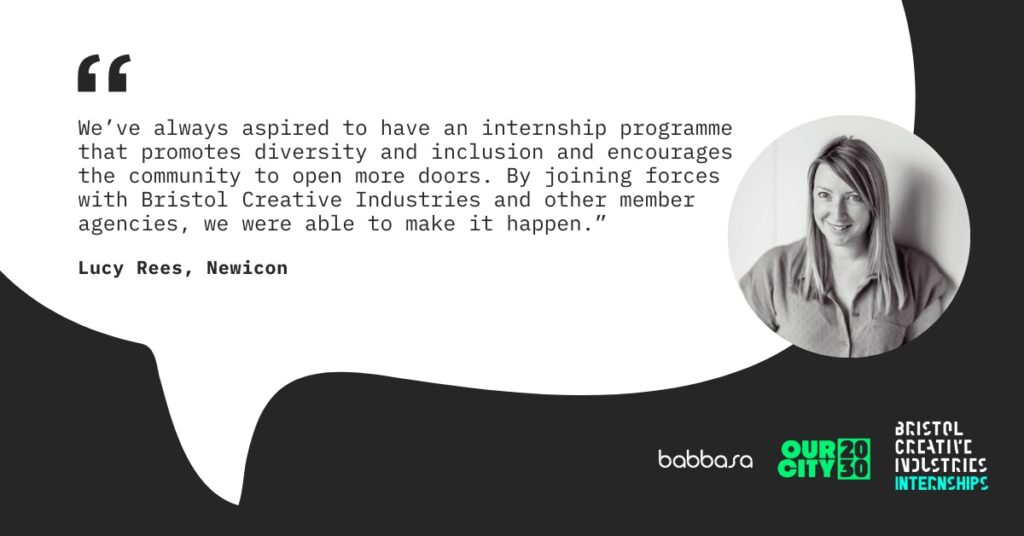
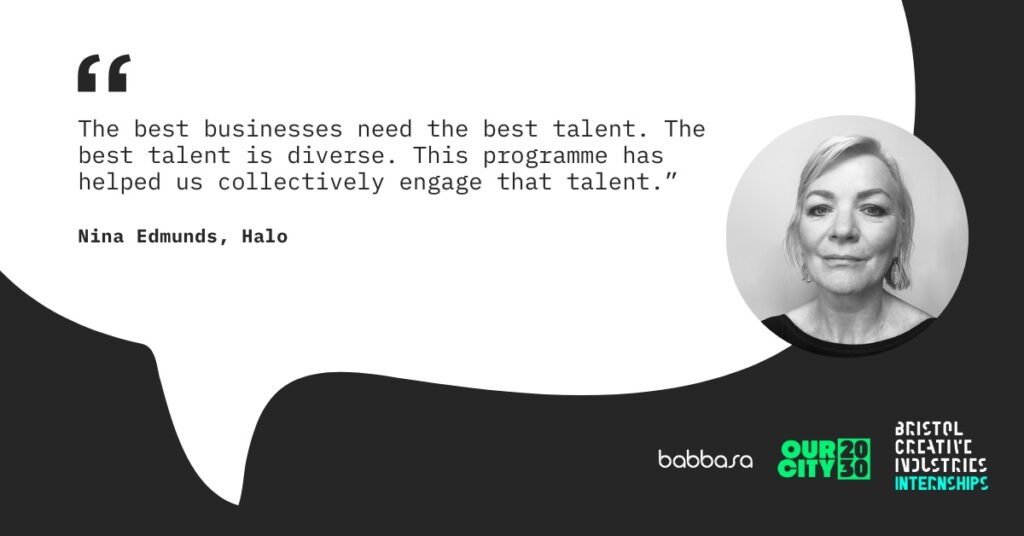
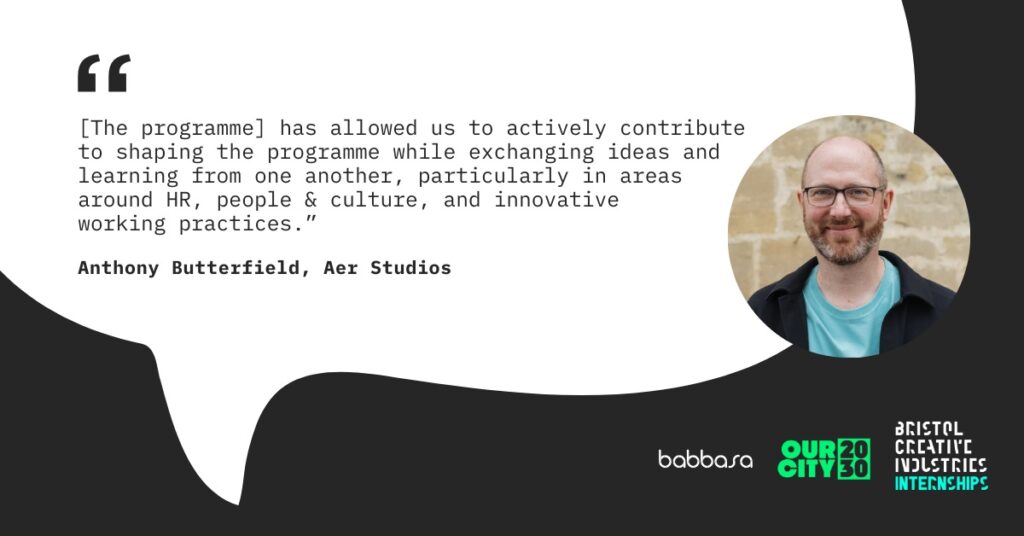
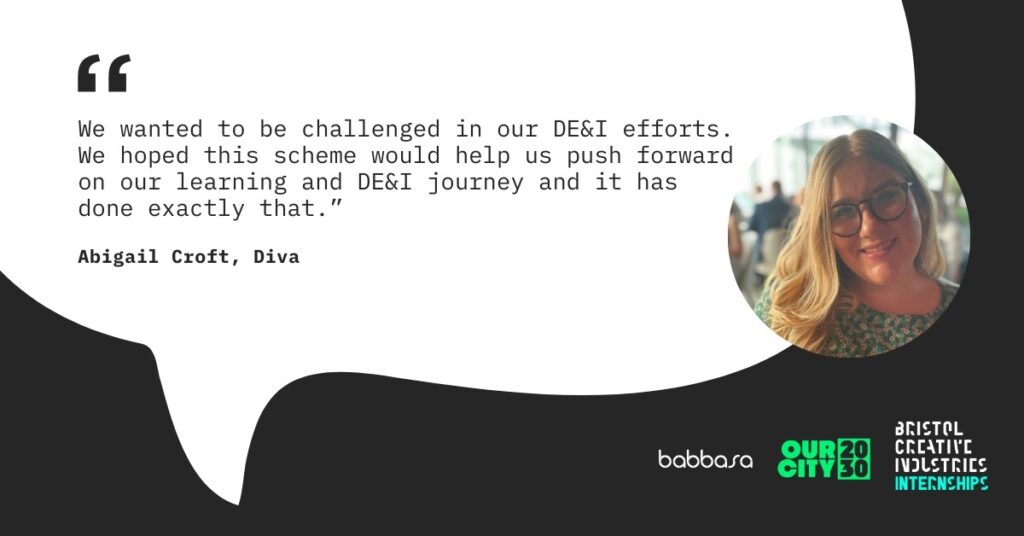
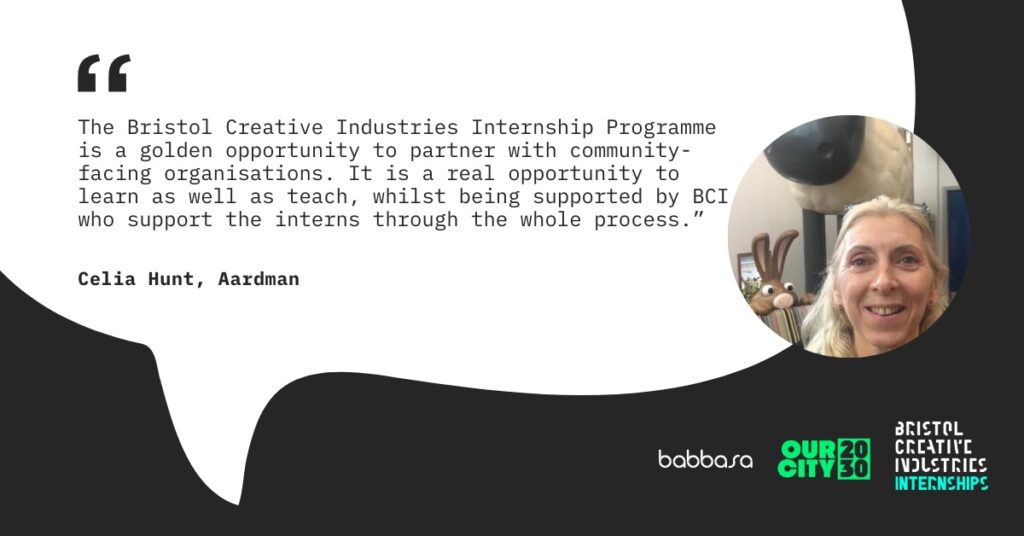
You need to load content from reCAPTCHA to submit the form. Please note that doing so will share data with third-party providers.
More Information